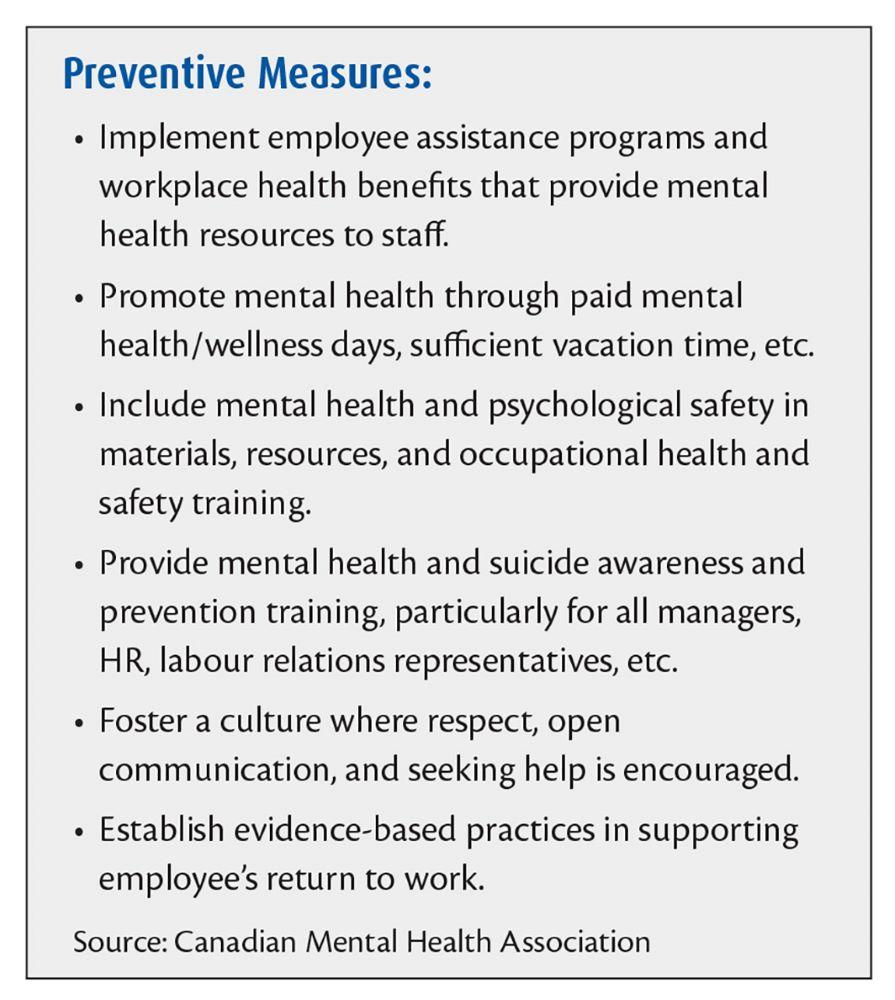Communications Manager, Government Relations
- FMA
- The Fabricator
- FABTECH
- Canadian Metalworking
Discussing mental health in the skilled trades
Critical part of health and safety attracts more attention in the workplace
- By Aysha Raad
- October 27, 2023
Mental health is an important concern that is increasingly getting more attention in the workplace. In the skilled trades sector, mental health and psychological safety go hand in hand with physical safety.
Mental health affects people across a variety of demographics. However, mental health concerns in men can be particularly dire, given they are not as likely to talk about their challenges, or seek help, due to social stigmas and society’s standards of masculinity. This absence of communication can often lead to a worsening of the condition.
According to the Canadian Men’s Health Foundation, approximately 1 million men suffer from major depression in Canada each year. Furthermore, statistics reported by the Public Health Agency of Canada (PHAC) in January 2023 state that approximately 12 people die by suicide each day in Canada and suicide rates are approximately three times higher among men, compared with women. Reports from Statistics Canada also show that men ages 45-59 are at the greatest risk.
Unfortunately, there are limited studies from Canada researching the risks and rates of mental illness and suicide in specific occupations. However, given the skilled trades are still male-dominated, conversations about mental health in the sector have become even more crucial.
It is important for employers to raise awareness of the risk factors related to mental health and create healthy and compassionate work environments that foster open communication, belonging, and respect. When there is an increased awareness of potential issues affecting workers’ mental health, it can be easier to notice the warning signs of someone in crisis. While addressing mental health concerns and suicide risks in the workplace can seem overwhelming and uncomfortable, there are many ways employers can create psychologically safe work environments for their employees (see the Prevention Measures text box for more information).
Research conducted during and after the peak of the COVID-19 pandemic also showed an increase in mental health challenges for many demographics. With this increased awareness of mental health concerns and the important role employers can play in providing support, more workplaces are taking steps to implement best practices to create a mentally healthy environment for employees. Some of these practices include promoting consistent and supportive leadership with active channels of communication, starting from the top and integrated into all levels of the organization. Employers also are training staff and leaders in mental health first aid through programs such as the Mental Health Commission of Canada’s The Working Mind and Mental Health First Aid Canada initiatives and offering mental health resources through employee assistance programs (EAPs) and tele-mental health platforms and apps.
In the construction industry in particular, several companies and organizations have developed resources and support groups and services to promote mental health and support workers with issues such as substance abuse. For instance, in British Columbia, the regional construction associations manage the Tailgate Toolkit (thetailgatetoolkit.ca) as a harm-reduction approach in response to the opioid overdose epidemic. North Island College in B.C. also has launched a pilot project to support students and apprentices in the trades with mental health services and resources. The program offers a dedicated mental health liaison who students can connect with confidentially, as well as resources so as apprentices advance in their training, they can become future mentors and support for the next generation of workers.
By creating a workplace culture that is based on open communication, respect, and support, employers can play an important role in advancing their workers’ mental health and psychological safety. Explore the resources shared here to see how your workplace can take the lead on mental health and crisis prevention.
Aysha Raad is communications lead, government relations, at CWB Group, 8360 Parkhill Dr., Milton, Ont. L9T 5V7, 800-844-6790, aysha.raad@cwbgroup.org, www.cwbgroup.org.
subscribe now


Keep up to date with the latest news, events, and technology for all things metal from our pair of monthly magazines written specifically for Canadian manufacturers!
Start Your Free SubscriptionAbout the Author
- Trending Articles
Aluminum MIG welding wire upgraded with a proprietary and patented surface treatment technology

Achieving success with mechanized plasma cutting

Hypertherm Associates partners with Rapyuta Robotics

Gema welcomes controller

Brushless copper tubing cutter adjusts to ODs up to 2-1/8 in.

- Industry Events
MME Winnipeg
- April 30, 2024
- Winnipeg, ON Canada
CTMA Economic Uncertainty: Helping You Navigate Windsor Seminar
- April 30, 2024
- Windsor, ON Canada
CTMA Economic Uncertainty: Helping You Navigate Kitchener Seminar
- May 2, 2024
- Kitchener, ON Canada
Automate 2024
- May 6 - 9, 2024
- Chicago, IL
ANCA Open House
- May 7 - 8, 2024
- Wixom, MI

















